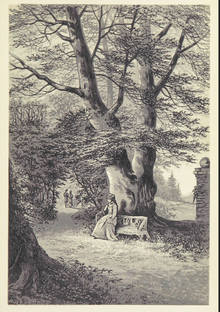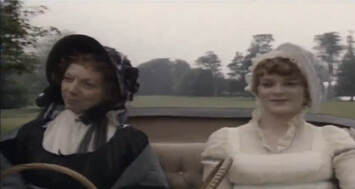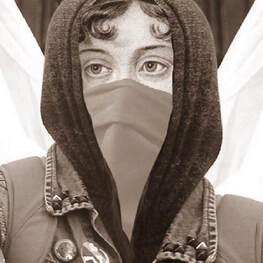A special guest editorial by Lila Proof, PhD

Early in the novel, the Bertram girls ask Fanny Price "which way she would go to get to Ireland." Fanny's response that she would "cross to the Isle of Wight," contextualizes the struggle against empire. She is saying that the Bertrams shouldn't go to Ireland at all--but tellingly, she is then derided as "ignorant."
But this is merely prelude to the Sotherton episode in the novel. On the journey out -- we might almost say "on the expedition" -- Julia Bertram sits beside Henry Crawford on the barouche-box. He "entertains" her with some anecdotes about an "old Irish groom" of his uncle's. Henry's bigoted remarks are not necessary to move the plot along. Austen could easily have come up with an alternative topic for Henry. Julia joins in the laughter at the expense of a man who is both an immigrant and a subordinate.
Thus the journey from Mansfield Park to Sotherton is established as a symbolic re-enactment of the conquest of Ireland, with Henry Crawford laughing as he revels in English hegemony.
Austen pointedly tells us that the manor house at Sotherton was built in the time of Queen Elizabeth the First. Readers are directed to cast their minds back to the age of Good Queen Bess, when the English were aggressively extending their control over Ulster and other Irish territories. Austen brings up the subject of Ireland again in the manor chapel. We see the colonial landscape paralleled and echoed with the interiority of domestic space when Mary Crawford speaks patronizingly of the former "Mrs. Bridgets" who used to pray there. Bridget is unmistakably an Irish/Gaelic name. The name "Bridget" does not appear anywhere else in Austen.
The manor-house at Sotherton is so large, Austen pointedly tells us, that most of the rooms are good only for government revenue in the form of the window tax. Why mention the government while touring a stately English home, unless to reference the depredations of empire? While Mrs. Rushworth complacently boasts of the "loyal efforts" of her ancestors in serving English kings and queens, we are told that "Henry Crawford was looking grave and shaking his head at the windows." Henry's imperializing gaze looks "across a lawn," and beyond that, to "tall iron palisades and gates." The introduction of the idea of palisades and gates in what is supposedly a serene and peaceful English landscape should give us a faint sense of unease. Why does Austen use the term "palisade," connoting as it does the idea of defense, of being besieged, under attack? Why not "wall" or "enclosure"?
Nothing is an accident in Austen. What do palisades have to do with Ireland? Rather a lot, actually. Palisades derives from the Latin "pale," as in "beyond the pale," an expression which has lingered in our language to the present day. It refers to the territory held by the earliest Norman invaders in Ireland. Going "beyond the pale" meant venturing beyond the safety of the palisade to the Irish wilderness beyond.
Once the young people venture beyond the safe enclosure around the house, they find themselves in the "Wilderness." The wilderness inevitably recalls characteristic portrayals of the Irish people as wild, uncouth, lawless savages. The wilderness has potency as both substance and symbol.
While walking in the Wilderness, Mary Crawford urges Edmund to join the army -- the same army which brutally crushed an Irish uprising in 1798. By never mentioning the Irish conquest directly, Austen places it everywhere in the narrative.
 Mrs. Norris departs with the spoils of empire -- cream cheese, pheasant eggs and heath
Mrs. Norris departs with the spoils of empire -- cream cheese, pheasant eggs and heath To the British, Ireland was seen as a strange, wild, foreign place. As well, Ireland was a place in need of "improvement." Charles Dickens, for example, approved of the Act of Union between England and Ireland on the grounds that Ireland "had been getting on very ill by itself." As Rushworth says, “It wants improvement, ma’am, beyond anything. I never saw a place that wanted so much improvement in my life."
Austen's repeated and ironic use of "improvement" suggests she is referencing Percy Bysshe Shelley's 1812 Address to the Irish People: "There is no doubt but the world is going wrong, or rather that it is very capable of being much improved... Society is produced by the wants, Government by the wickedness, and a state of just and happy equality, by the improvement and reason of man... What I mean by this improvement is, the inducement of a more equal and general diffusion of happiness and liberty." Thus Austen, with double-edged meaning, condemns the "improvement" of English rapacity while pointing to Godwinian anarchism as the antidote to colonialism.
After their walk in the wilderness, Mary, Edmund and Fanny return to the house to "lounge away" the time until dinner "with chit-chat, and Quarterly Reviews." The Quarterly Review was a conservative periodical, favored by politicians who were opposed to Catholic Emancipation. By characterizing the Review as something only fit to lounge away the time with, intellectually on a par with "chit chat," we can practically see Austen's lip curling in a sneer. This was a particularly daring thrust, as the Quarterly Review was the flagship publication of John Murray, her own publisher. Was Murray so incensed by Austen's speaking truth to power, that he declined to send Mansfield Park out to literary magazines? Can this be the reason why the novel received no reviews? We can only speculate. But really, no other interpretation seems possible.
Austen tells us that Mrs. Norris "obtained" some cream cheese and pheasants' eggs. Mrs. Norris falsely represents her ill-gotten gains as being pressed upon her by the housekeeper: ("I stood out as long as I could.") But the cream cheese is a form of forced tribute. It is not insignificant that cheese is created by pressing curds into a mold; the associations with force, conformity, and violence, are unsettling.
The Bertrams, Crawfords, and Mrs. Norris hastily decamp from Sotherton as soon as is decently possible after eating a hearty dinner. They figuratively represent the absentee landlords of Ireland who use the rents from their Irish holdings to maintain their lifestyles back in England.
 Speaking truth to power!
Speaking truth to power! And of all the plants which Mrs. Norris could have borne away from Sotherton, she has taken a "very curious specimen" of heath! Not merely a heath; Austen emphasizes the "other-ness" of the heath. While heath grows abundantly in Ireland, heaths and heathers are more commonly associated with Scotland. Does Austen intend for the heath to allude to the Scots diaspora? Is the transplanted heath a reference to the notorious Highland Clearances? The question is one that merits additional study.
What is beyond dispute, however, is that a novel that has been naively interpreted as focusing on self-knowledge and personal morality is in fact nothing of the kind. Austen stands revealed not as a chronicler of individual virtues, faults, and foibles, but as a radical activist who condemned her country and her countrymen in the starkest (but artfully understated) terms.
The Sotherton episode closes with a telling remark about the uneasy feelings of the invaders -- outwardly triumphing, perhaps, but inwardly guilty: "[W]hen Mrs. Norris ceased speaking, it was altogether a silent drive to those within."
The silence is deafening.
| Author's note: I am indebted to the pioneering scholarship of Dr. Aprille Stulti in her seminal work, Conquest and Cream Cheese: Toward an Anglo-Irish Understanding of Mansfield Park, although academic integrity compels me to note that Professor Stulti did not find half of the obvious allusions which I have found. My colleague Aprille might say, with Fanny, “It was foolish of me not to think of all that." Update: Dr. Stulti has announced some of her new research into Mansfield Park in this blog post. |
 RSS Feed
RSS Feed